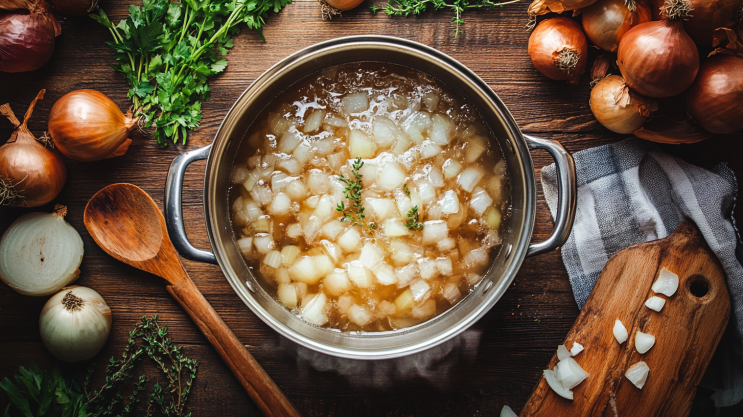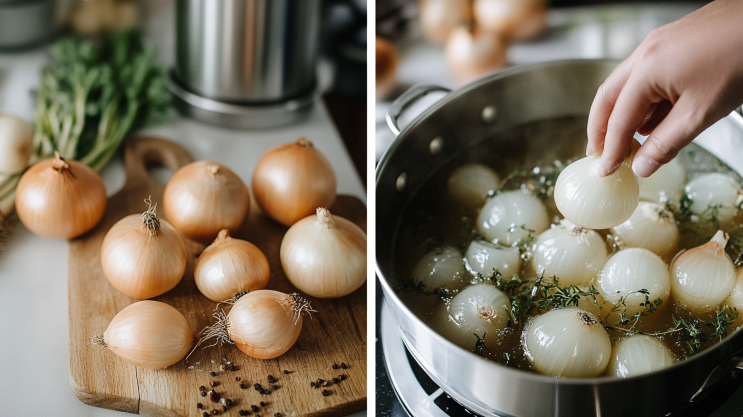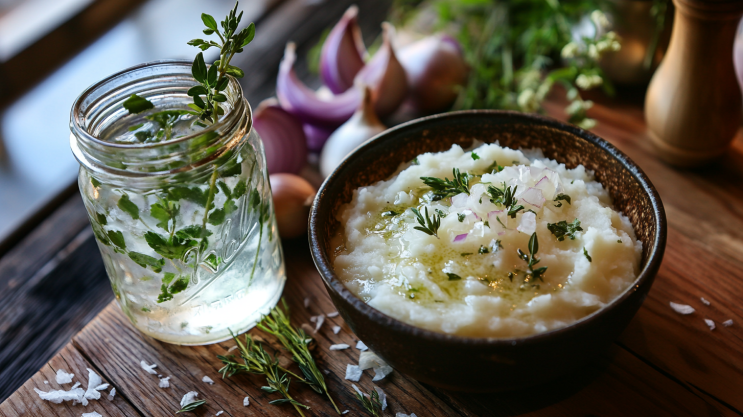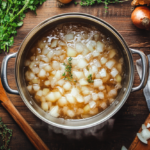
Table of Contents
Boiled onions are often underestimated, yet they hold incredible potential in the culinary world and beyond. From their rich history and diverse uses in the kitchen to their powerful health benefits, onion boil is an essential technique every home cook should know. This article explores everything from preparing the perfect boiled onion to its remarkable health advantages, answering common questions along the way. Whether you’re a seasoned chef or a curious foodie, you’ll discover new ways to incorporate this simple yet transformative cooking method into your routine.
What Is an Onion Boil?
Defining Onion Boil: A Simple Cooking Technique
At its core, an onion boil is just what it sounds like—boiling onions in water. This straightforward method softens the onions, releasing their natural sweetness and creating a tender texture that’s perfect for various dishes. But there’s more to this technique than meets the eye. It’s not just about cooking; it’s about transforming an everyday vegetable into a versatile ingredient that enhances flavor, texture, and even nutrition.
Boiling onions unlocks their potential in unexpected ways. They can be used as a standalone side dish, blended into soups, or even mashed into a puree. Plus, the water used to boil the onions absorbs some of their nutrients and flavor, making it a healthful base for teas, broths, or detox drinks.
The History and Culinary Use of Boiled Onions
Boiling onions is not a modern invention; it’s a technique steeped in history. Cultures worldwide have embraced onion boil for centuries, not just for flavor but for its medicinal properties. In traditional remedies, boiled onion water was often used to soothe colds, aid digestion, and promote overall health.
Culinary enthusiasts and chefs alike love boiled onions for their versatility. From comforting French onion soup to hearty stews, this simple technique has inspired countless recipes. With their mild flavor and tender consistency, boiled onions can be a game-changer in the kitchen, adding depth and richness to any dish.
The Nutritional Value of Boiled Onions
Key Nutrients Found in Onions
Onions are a nutrient-dense vegetable packed with vitamins, minerals, and antioxidants. When you prepare an onion boil, these nutrients become more accessible while enhancing their digestibility. They are particularly rich in vitamin C, which supports immunity, and vitamin B6, essential for brain health and energy production. Onions are also a great source of potassium, magnesium, and small amounts of iron.
Moreover, they contain sulfur compounds like allicin, which have antibacterial and anti-inflammatory properties. These nutrients remain intact during boiling, making boiled onions a healthy addition to your meals.
How Boiling Affects the Nutritional Content of Onions
While boiling can cause some water-soluble vitamins, like vitamin C, to leach into the water, the remaining nutrients stay in the onion. Interestingly, the water used in an onion boil absorbs these nutrients, making it a potent base for broths or teas. This nutrient retention ensures that boiling onions is not just a method of cooking but a way to extract their full health potential.
Why Onion Boil Is a Popular Health Choice
The process of boiling onions makes them softer and easier to digest, which is especially beneficial for people with sensitive stomachs. In addition, the mild flavor of boiled onions appeals to those who might find raw onions too overpowering. Whether consumed as part of a dish or as onion water, this simple method unlocks the many health benefits onions have to offer.
What Does Boiling an Onion Do?
Changes in Flavor and Texture During Boiling
Boiling onions transforms their sharp, pungent taste into a milder, sweeter flavor. The cooking process breaks down the sulfur compounds that give raw onions their strong bite, resulting in a softer, more pleasant taste. Texturally, boiled onions become tender and creamy, making them perfect for soups, stews, or purees.
How Boiling Enhances Digestibility
Raw onions can sometimes be hard to digest, causing bloating or discomfort for some people. Boiling onions softens their fibers, making them gentler on the digestive system. Additionally, this process neutralizes certain compounds that can irritate the stomach lining, making onion boil a preferred option for those with digestive sensitivities.
The Role of Boiled Onions in Detoxifying the Body
Onions are naturally detoxifying, and boiling amplifies this benefit by infusing their nutrients into water. Onion water, created during boiling, is often consumed for its purported ability to flush toxins from the liver and kidneys. This detox effect, coupled with their anti-inflammatory properties, has made boiled onions a popular remedy in traditional medicine.
For another hearty recipe that incorporates boiled vegetables, check out the Swamp Soup on Boast Recipes.
How to Prepare the Perfect Onion Boil
Choosing the Right Type of Onion for Boiling
When it comes to preparing the perfect onion boil, choosing the right type of onion is crucial. Sweet onions, like Vidalia or Walla Walla, work best if you prefer a milder, sweeter flavor. For a more robust and earthy taste, yellow or white onions are excellent choices. Red onions can also be boiled, but their flavor is stronger, and their vibrant color may fade during cooking. Selecting fresh, firm onions ensures the best results, as they retain their texture and nutrients during boiling.
Step-by-Step Guide to Boiling Onions

- Peel and Prep: Start by peeling the onions. You can boil them whole for a dramatic presentation or cut them into quarters for quicker cooking.
- Choose Your Liquid: Fill a pot with water, broth, or even milk for a creamier texture. Adding a pinch of salt enhances flavor.
- Boil and Simmer: Bring the liquid to a boil, then reduce the heat to a gentle simmer. Cook for 10–20 minutes, depending on the size of the onion.
- Test for Doneness: Use a fork to check if the onions are tender. They should be soft but not falling apart.
Common Mistakes to Avoid When Boiling Onions
One common mistake is overcooking the onions, which can make them mushy and unappetizing. Another is using too much water, which can dilute the onions’ natural flavor. Always keep the onions partially submerged instead of flooding them with water. Finally, save the flavorful onion water—it packs a wealth of nutrients and works beautifully in soups or sauces.
Variations: Adding Herbs, Spices, and Flavors to Boiled Onions
Elevate your onion boil by adding herbs like thyme, bay leaves, or rosemary to the boiling liquid. For a hint of spice, try a pinch of black pepper or crushed red chili flakes. A splash of vinegar or lemon juice can brighten the flavor, making your boiled onions even more delicious.
Health Benefits of Boiling Onions and Drinking the Water
Improved Digestion and Gut Health
One of the standout benefits of an onion boil is its ability to aid digestion. Boiled onions are easier on the stomach than their raw counterparts, thanks to their softened fibers. Additionally, the water left after boiling absorbs prebiotics, which promote the growth of healthy gut bacteria.
Boosting Immunity with Onion Water
Onion water, created during boiling, is rich in sulfur compounds and antioxidants. These elements are known to strengthen the immune system and help the body fight infections. Drinking warm onion water during cold and flu season can provide relief from symptoms like congestion or a sore throat.
Anti-inflammatory and Antioxidant Properties
Onions contain quercetin, a powerful antioxidant that reduces inflammation. Boiling onions releases this compound into the water, making it easy to consume. Regular intake of boiled onions or onion water can help alleviate symptoms of arthritis, asthma, and other inflammatory conditions.
Hydration and Detoxification Benefits
The hydration and detoxifying benefits of onion boil are often overlooked. Drinking onion water hydrates the body while flushing out toxins from the liver and kidneys. Adding a slice of lemon or a dash of honey to onion water enhances its flavor and detoxifying properties.
For more hearty and healthy ideas, explore the Swamp Soup recipe on Boast Recipes, which pairs beautifully with boiled onions.
Is Boiled Onion Good for You? Common Questions Answered
What Are the Healthiest Ways to Consume Boiled Onions?
Boiled onions are incredibly versatile and can be enjoyed in several ways to maximize their health benefits. You can eat them as a side dish, mash them into purees, or blend them into soups for added flavor and nutrition. Drinking the leftover water from an onion boil is another excellent way to boost your intake of antioxidants and other nutrients. For a creative twist, add spices like turmeric or cinnamon to the onion water for an immunity-boosting drink.
How Long Should You Boil Onions for Maximum Benefits?
Timing is key when preparing an onion boil. To retain the maximum nutrients, boil onions for 10–20 minutes, depending on their size. Overcooking can cause the onions to lose some of their water-soluble vitamins, so aim for a tender texture that’s soft enough to eat but still holds its shape. If you’re planning to use the onion water, avoid boiling it down too much, as this may concentrate the flavor but reduce the liquid volume.
Can Onion Boil Help with Specific Health Issues?
Yes! Consuming boiled onions or onion water can help address various health concerns. For example, the anti-inflammatory properties of onions can ease symptoms of arthritis, while their high fiber content supports digestion. Some studies suggest that the antioxidants in onions may reduce the risk of certain chronic diseases, making an onion boil a simple yet powerful addition to your diet.
Are There Any Downsides to Eating Boiled Onions?
While boiled onions are generally safe for most people, consuming them in excess might cause digestive discomfort for those sensitive to fiber or FODMAPs. Additionally, onion water has a distinct taste that may not appeal to everyone. However, with the right preparation, these minor drawbacks are easily managed.
Creative Ways to Use Boiled Onions in Recipes
Adding Boiled Onions to Soups and Stews
Boiled onions are a game-changer when added to soups and stews. Their soft texture and sweet flavor make them the perfect complement to hearty ingredients like lentils, chicken, or root vegetables. Whether it’s a classic French onion soup or a rustic stew, an onion boil is a must for creating depth and richness in your dishes.
Using Boiled Onions as a Puree or Side Dish

For a creamy, flavorful side dish, mash boiled onions with a touch of butter and seasonings like garlic powder or thyme. This puree pairs well with roasted meats or grilled fish. Alternatively, serve the onions whole with a drizzle of olive oil and a sprinkle of fresh herbs for a simple yet elegant accompaniment.
Innovative Ways to Incorporate Onion Water into Meals
Don’t let the nutrient-packed onion water go to waste! Use it as a base for sauces, gravies, or even a risotto. You can also add it to your morning smoothie for a health boost (just mix with other strong flavors like ginger or citrus). For a more traditional approach, sip it warm with a pinch of salt as a soothing broth.
Tip: For more ideas on incorporating boiled vegetables into your recipes, check out Boast Recipes for inspiration.
What Does Boiling an Onion Do?
Boiling an onion transforms it in several ways. First, it softens the onion, making it easier to digest. Second, the heat releases its natural sugars, giving it a milder, sweeter flavor. Additionally, an onion boil helps extract beneficial nutrients like antioxidants and sulfur compounds into the water, making both the onion and the liquid rich in health benefits.
Is Boiled Onion Good for You?
Absolutely! Boiled onions are packed with essential nutrients like vitamin C, B6, and potassium. The onion boil process enhances digestibility, making it a great option for individuals with sensitive stomachs. Moreover, the water left from boiling is a powerhouse of antioxidants and can support detoxification, boost immunity, and even reduce inflammation.
How Long to Cook Boil Onions?
The ideal cooking time for an onion boil depends on the size of the onion. Smaller onions typically take around 10–15 minutes, while larger ones may need up to 20 minutes. To test if they’re ready, insert a fork—it should slide in easily without the onion falling apart. Overcooking can diminish the nutritional value, so keep an eye on the timer!
What Are the Benefits of Boiling Onion and Drinking Water?
Drinking the water from an onion boil provides hydration, detoxification, and a boost of antioxidants. This nutrient-rich liquid is especially helpful during flu season or when you need to soothe a sore throat. It’s also known to promote digestion, improve skin health, and support kidney function. To make it more palatable, try adding a squeeze of lemon or a touch of honey.
Final Thoughts on Onion Boil
Why You Should Try Onion Boil Today
An onion boil is more than just a cooking method—it’s a simple yet powerful way to unlock the full potential of onions. Whether you enjoy them as a side dish, incorporate them into recipes, or drink the nutrient-packed water, boiled onions offer a wealth of benefits for your health and culinary adventures. Plus, they’re easy to prepare and incredibly versatile, making them suitable for a variety of dishes.
Embrace the Simplicity and Health Benefits
Incorporating boiled onions into your diet is a small change that can yield big results. Their mild flavor and tender texture make them appealing to even the pickiest eaters, while their health benefits are undeniable. Whether you’re a seasoned chef or just starting out, an onion boil is a technique worth mastering. Start experimenting today, and discover how this humble ingredient can elevate your meals and improve your well-being.
Print
The Ultimate Guide to Onion Boil: Benefits, Recipes, and Uses
- Total Time: 20 minutes
- Yield: 4 servings
- Diet: Vegan
Description
Boiling onions is a simple yet powerful way to enhance their natural sweetness and unlock their health benefits. This technique transforms onions into a soft, flavorful ingredient perfect for soups, stews, purees, or even as a nutritious side dish. Plus, the onion water can be used for broths or detox drinks.
Ingredients
-
4 medium onions (yellow, white, or sweet)
-
4 cups water or broth
-
1 teaspoon salt (optional)
-
1 bay leaf (optional)
-
1 clove garlic, smashed (optional)
-
1 teaspoon olive oil or butter (optional, for serving)
Instructions
-
Peel the onions and leave them whole for a dramatic presentation or cut them into quarters for quicker cooking.
-
In a medium pot, bring the water or broth to a boil.
-
Add the onions along with salt, bay leaf, and garlic if using.
-
Reduce the heat to a simmer and cook for 10-20 minutes, or until the onions are tender when pierced with a fork.
-
Remove the onions from the water and serve as a side dish, drizzled with olive oil or butter if desired.
-
Save the onion water for soups, stews, or as a detox drink.
Notes
-
For extra flavor, add herbs like thyme, rosemary, or black pepper.
-
Red onions can be used, but their color may fade.
-
To make a puree, blend the boiled onions with a bit of their cooking water until smooth.
- Prep Time: 5 minutes
- Cook Time: 15 minutes
- Category: Dinner, lunch
- Method: Boiling
- Cuisine: Universal
Nutrition
- Serving Size: 1 boiled onion
- Calories: 45 kcal
- Sugar: 4 g
- Sodium: 200 mg (varies with salt use)
- Fat: 0.5 g
- Saturated Fat: 0 g
- Carbohydrates: 10 g
- Fiber: 2 g
- Protein: 1 g
- Cholesterol: 0 mg
Keywords: boiled onions, onion boil, detox onions, onion soup base, healthy side dish

